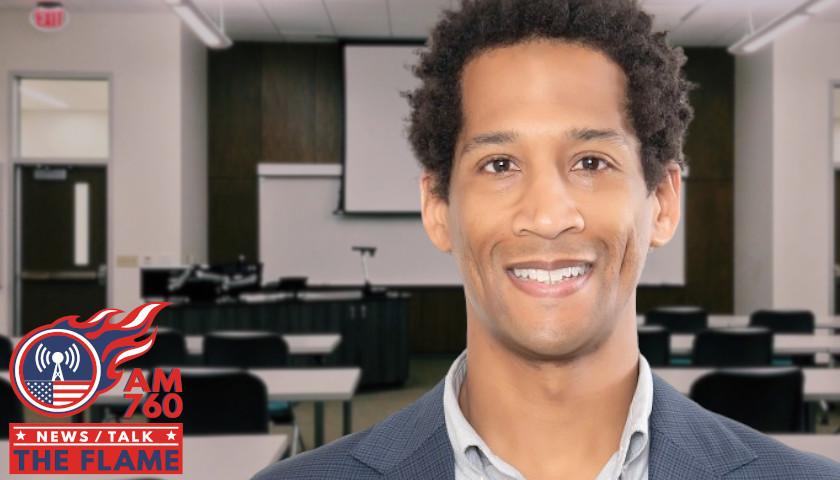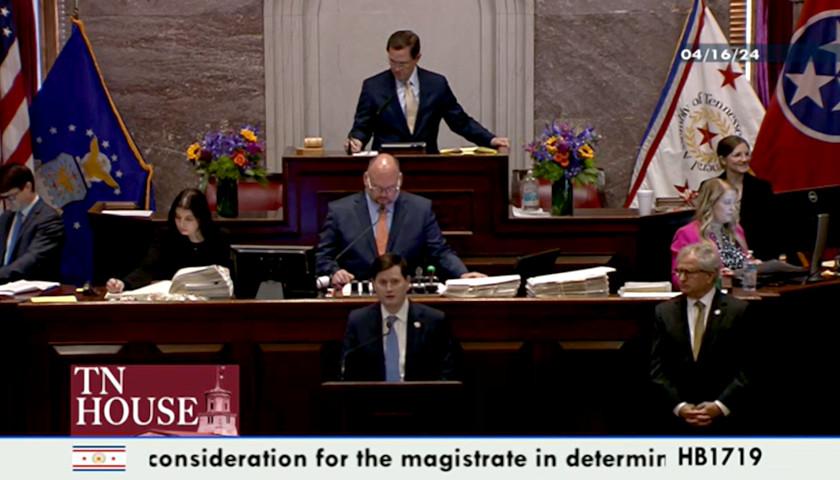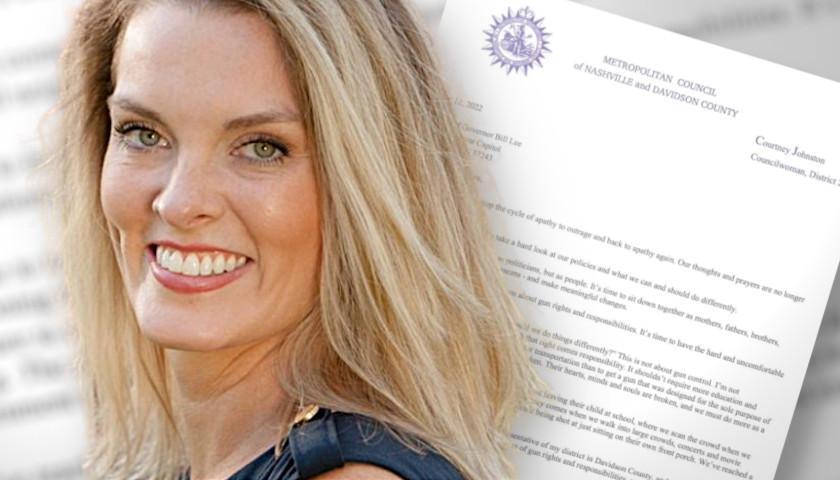American Federation for Children Senior Fellow Shaka Mitchell joined The Tennessee Star Report with Michael Patrick Leahy on Wednesday to dive into the details of Gov. Bill Lee’s newly unveiled Education Freedom Scholarship Act, set to revolutionize school choice in Tennessee.
TRANSCRIPT
Michael Patrick Leahy: 12:20 p.m. broadcasting live from our studios and downtown Nashville, just a quarter of a mile away from the Tennessee State Capitol. We’re delighted to have in-studio, the original star panelist, Crom Carmichael; and from American Federation for Children, our very good friend, Tennessee native, graduate of Belmont, Shaka Mitchell.
Shaka, you were going to lay out for us the details of Governor Bill Lee’s Education Freedom Scholarship Act.
Shaka Mitchell: The Education Freedom Scholarship Act, and this has not been legislation introduced yet because we’re only in December. We’re gonna see that so for folks who may not be familiar with the process, legislation will come in the new year; the General Assembly will start in January.
Michael Patrick Leahy: January 9th, they convene, and then a little later, the governor delivers his State of the State.
Shaka Mitchell: That’s right.
Michael Patrick Leahy: And then at some point, thereabouts, a very detailed bill will be introduced.
Shaka Mitchell: Exactly. So what I would urge patience on is I can’t tell you this a precise section of the bill, you know, C section, II.B… whatever, whatever.
We don’t know that. But we do have some details that I’d love to share with you. I’d love to share with folks who are listening.
Michael Patrick Leahy: Let’s hear it. What are those details?
Shaka Mitchell: So the guts of this are that in the first year – which would be the ’24-’25 school year – so next fall.
Michael Patrick Leahy: So if parents now are thinking about what they’re going to do in the fall of 2024. The next academic year this might be something–
Shaka Mitchell: This might be that they sort of put into the hopper a little bit and think about, ‘Hey, might this be something that’s possible for our family?’
So this would be a new program, meaning Tennessee’s already got two other programs that are similar. One that despite their best efforts was upheld by the Tennessee Supreme Court.
So despite the efforts of former Mayor Cooper here in Nashville who challenged the program, we’ve already got an education savings account program. If you’re a lower-income family in Memphis, or Nashville, or Chattanooga, you can participate in that one.
Michael Patrick Leahy: And I think the number of participants now is about 2,000.
Shaka Mitchell: I think that’s right. Yeah, about 2,000 in that one.
Crom Carmichael: And it can be up to 5,000. I mean, that’s what the legislation was. That’s the current law. And that’s for three counties.
Shaka Mitchell: That’s right.
There’s also another program that if you’ve got a student with special needs you can participate in that – that’s statewide. That’s anywhere any student with, you know, one of – I don’t know – it’s a list of about a dozen special needs.
Michael Patrick Leahy: Is it a separate program?
Shaka Mitchell: It’s a separate program.
Michael Patrick Leahy: And what do they get? Do they get money, or?
Shaka Mitchell: Yes, they get roughly the same amount. I think it’s somewhere around $8,000 per student per year.
Michael Patrick Leahy: I didn’t know about that one. That’s interesting. We’d been talking about this when Jordan Long from the Beacon Impact came by on Monday.
Shaka Mitchell: Yeah. So those are two programs.
Crom Carmichael: Now is that also, you said special needs. Is it also income-based?
Shaka Mitchell: It’s not. It’s not income-based.
So if you’re, if you’re a family in Williamson County, just south of Nashville, family in Williamson County, and you’ve got a student with special needs, like autism, then you would be eligible for this, and you can use those funds and go to a private school there if you wanted.
If you needed some in-home services, let’s say it’s a real severe disability. You could use that. All right.
Michael Patrick Leahy: And the number of participants in that program is still relatively low.
Shaka Mitchell: Relatively low. I think that’s somewhere around a 1,000 or 1,500.
Michael Patrick Leahy: That’s what I seem to recall as well.
Shaka Mitchell: So this would be the Education Freedom Scholarship Act – what Governor Lee is talking about now – this would be a third program, which, by the way, would put us in line with states like Indiana, Ohio, Wisconsin, Florida, Arizona, that had multiple programs. And then we finally said, all right, let’s just, let’s just do the whole thing. Instead of eating all these ingredients, let’s just have the whole meal.
Michael Patrick Leahy: Now I’m getting hungry already.
So Shaka, we have 95 counties. Yeah. Right now, in the state of Tennessee. Currently, one of those programs applies to three counties. The governor’s bill for the Education Freedom Scholarship Act. Tell us the details. Will it apply to all 95 counties?
Shaka Mitchell: That’s right.
It would apply to all families in all 95 counties. By year two, it would be families of any income.
Now, in the first year, I mentioned that would be the ’24-’25 school year, so that’s next school year, next fall, there would be 20,000 of these scholarships available statewide.
So there, you know, so there’s gonna be a little limitation there, but 20,000 is still a lot.
Crom Carmichael: Now, is that 20,000, does that include those covered by the other two programs, or are those other two programs still in, well, one will disappear because it’s three counties, but will the special needs program, will it still exist?
Shaka Mitchell: Yeah, actually both programs would still exist, both those other programs. So this would be 20,000 in addition to those other two programs.
Crom Carmichael: Okay, so it just adds, essentially, it adds to the three counties. It adds all the rest.
Michael Patrick Leahy: Shaka, my understanding is in the first year, 2024-25 of that 20,000 – 10,000 would be available to anybody with no income limitations.
Shaka Mitchell: Yep.
Michael Patrick Leahy: And then 10,000 would have specific income limitations.
Shaka Mitchell: Correct. And, I’ll say for our part at American Federation for Children, we think that’s pretty important. And I’ll tell you why, because we, from a mission standpoint, we know that school choice has always existed. The thing is, it’s existed for families who can afford it.
Michael Patrick Leahy: A very good point.
Shaka Mitchell: And so the problem is, there’s a lot of families who can’t – and you don’t have to be a family that’s destitute. If you’re a family that works a very fine job, you know, you’ve got two parents and one parent is a police officer and the other parent is a nurse or is a teacher, but your local school isn’t working for you, you probably don’t have enough extra income to figure out how to make private tuition work.
Michael Patrick Leahy: So, in reality, for that family, financially, they don’t have a choice. The only option they have is to go to the local K-12 public school.
Shaka Mitchell: That’s right. And that may not work. Listen, if that works, fantastic. God bless America!
But if it doesn’t work – and we know, honestly, the numbers, you know, if we’re being transparent, the numbers say it doesn’t work for a lot of students.
Michael Patrick Leahy: Well, I mean, if you look at academic performance, basic reading, writing, arithmetic, third-grade, eighth-grade, understanding the civics – the proficiency levels across the state range from 30 percent to 45 percent, but mostly more towards 30 percent.
Most of our 95 counties have poor K-12 public school systems today.
Shaka Mitchell: The reality is that most of the conventional public school systems, they’re just not built for every kid. And that’s not to trash public schools. That’s just to be honest and to be realistic.
And, you know, I’m a parent. I’ve got three girls of my own. They are not the same. It would be, it would be much easier.
Michael Patrick Leahy: Every parent listening just said, ‘Oh yeah, I understand that they’re not the same.’ And they have different needs and requirements and capabilities.
Shaka Mitchell: Yeah, exactly right.
Crom Carmichael: And definitely some schools will cater. What will happen over time is schools will become, I’m not going to say specialists in the sense that they teach math or they teach this, but what they’ll do is they will become very good at teaching kids who have certain, certain needs.
And so then children who have certain needs will then get the math, the reading, the science, all the different things that they need, but they’ll get it from a school that knows how to teach to their needs.
Michael Patrick Leahy: So Shaka, year one, 20,000. And 10,000 for income based and 10, 000 for anybody.
What happens year two?
Shaka Mitchell: By year two, the plan is to blow the doors off and to say, ‘Okay, how many families are interested in this?’ And let’s make sure that all of them can have access.
Michael Patrick Leahy: There are roughly 1 million K-12 public school students in the State of Tennessee today. That’s right, year one.
You’re talking about 20,000, which is 2 percent.
Crom Carmichael: Michael, let me ask you a real quick question. When you say they’re a million, how many of those are already in private schools?
Michael Patrick Leahy: No, I said that’s a million public schools.
Crom Carmichael: Excuse me, sorry.
Michael Patrick Leahy: I think private schools here probably run about, what, 50, 000, 75, 000? Maybe more than that.
Shaka Mitchell: Yeah, somewhere between 75 and 100,000.
Michael Patrick Leahy: We’ll have more and when you come back, Shaka, we want to lay out a little bit more of the details of the plan.
And then I’m going to throw you some objections to the plan. You ready?
Shaka Mitchell: Let’s do it
Michael Patrick Leahy: All right.
We’ll have more when we get back.
This is The Tennessee Star Report.
I’m Michael Patrick Leahy.
We’ll be right back after this.
– – –
Listen to The Tennessee Star Report with Michael Patrick Leahy weekdays from 11:00 am to 1:00 pm on WENO AM760 The Flame.
Photo “Shaka Mitchell” by American Federation for Children.









One day people will be very sorry they fell for this funding scheme designed to eventually suck private and religious education under the federal and state mandates for education. American Federation for Children is Betsy DaVos organization. And Lee has had one of their pets on his campaign and in his administration since day one and THAT is why all these schemes are surfacing. Lee is obviously looking for bigger and better things. With these people it is always about them never our children. Now isn’t it true that our Assembly is discussing how we can remove TN from the US Dept. of Education??? So why would we be implemented these false choice programs. In the end parents will only have choice of location but not in what your kids are taught. So if the goal is to get TN out from under the federal thumb then why not just work on making our current schools the best they can be? I tried to warn people years ago about Race to the Top and Common Core but no one would listen. The money meant more than our children’s future. And now we are faced with exactly what I warned would happen. So I am again warning people and again they won’t listen. And 10 years from now we will find ourselves in the same mess but even worse not better than it is now.
What about the rest of the interview.